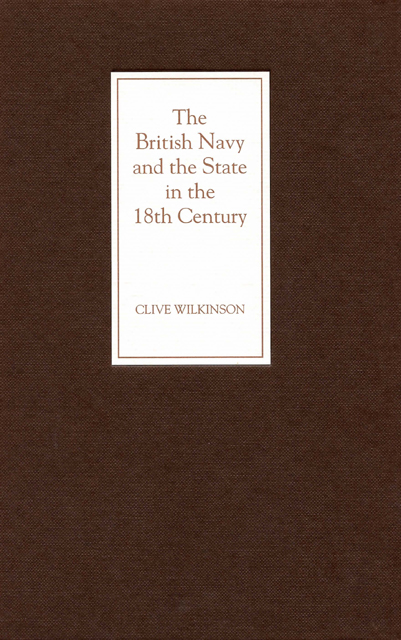Book contents
- Frontmatter
- Contents
- Foreword
- Acknowledgements
- Abbreviations
- 1 The Myth of a Paper Fleet
- 2 Government and the Navy
- 3 ‘Treating the House with Contempt’: British Naval Finance in the Eighteenth Century
- 4 Crisis and Victory: The Navy, 1714–62
- 5 The Peace Establishment I: Demobilization and Retrenchment, 1763–6
- 6 The Peace Establishment II: Stability, Innovation, and the Falklands, 1766–70
- 7 Sandwich, Parliament and the Paper Fleet, 1771–9
- 8 Conclusion
- Appendix 1 Extraordinary Estimates 1750–76
- Appendix 2 Extraordinary Estimate, Navy Office, 2 February 1767
- Appendix 3 Estimate of Monies Needed (ADM B 177, 5 August 1765)
- Appendix 4 ‘Plan of Expense of His Majesty’s Navy for the Year 1768’ (ADM B 181, 27 May 1768)
- Appendix 5 Account of the Course of the Navy (Fragment, ADM B 183, 6 August 1770)
- Appendix 6 A List of the Ships of the Royal Navy, 1 January 1763, with the Condition of the Navy on Survey (ADM 7 553)
- Appendix 7 British Battlefleet 1714–80
- Appendix 8 Environmental Impact on the Navy’s Ships, 1710–80
- Appendix 9 Naval Finance and Expenditure
- Appendix 10 The Procedure for Voting a Supply to the Navy
- Bibliography
- Index
2 - Government and the Navy
Published online by Cambridge University Press: 18 March 2023
- Frontmatter
- Contents
- Foreword
- Acknowledgements
- Abbreviations
- 1 The Myth of a Paper Fleet
- 2 Government and the Navy
- 3 ‘Treating the House with Contempt’: British Naval Finance in the Eighteenth Century
- 4 Crisis and Victory: The Navy, 1714–62
- 5 The Peace Establishment I: Demobilization and Retrenchment, 1763–6
- 6 The Peace Establishment II: Stability, Innovation, and the Falklands, 1766–70
- 7 Sandwich, Parliament and the Paper Fleet, 1771–9
- 8 Conclusion
- Appendix 1 Extraordinary Estimates 1750–76
- Appendix 2 Extraordinary Estimate, Navy Office, 2 February 1767
- Appendix 3 Estimate of Monies Needed (ADM B 177, 5 August 1765)
- Appendix 4 ‘Plan of Expense of His Majesty’s Navy for the Year 1768’ (ADM B 181, 27 May 1768)
- Appendix 5 Account of the Course of the Navy (Fragment, ADM B 183, 6 August 1770)
- Appendix 6 A List of the Ships of the Royal Navy, 1 January 1763, with the Condition of the Navy on Survey (ADM 7 553)
- Appendix 7 British Battlefleet 1714–80
- Appendix 8 Environmental Impact on the Navy’s Ships, 1710–80
- Appendix 9 Naval Finance and Expenditure
- Appendix 10 The Procedure for Voting a Supply to the Navy
- Bibliography
- Index
Summary
Britain’s naval administration in the middle decades of the eighteenth century can best be understood by studying three main areas that can be broadly defined as politics, personalities and systems. Politics encompasses national politics and political patronage and for our specific purposes, interdepartmental politics. The study of individual personalities can examine character and personal ambition as well as political beliefs and ability. These facets overlay and interact with the administrative process. What is of interest is why individuals took on a post or office such as Admiralty Commissioner, what was their function in that position and then what they actually did or did not do. We can then judge their impact on the administrative system and chart the sequence of events in which they were involved and evaluate the consequences of their actions. This not only sheds light on the affairs of the Navy but also provides a number of insights into the structure, function and the process of eighteenth-century government.
The highest level of the Navy’s civil administration was the Board of Admiralty. This was made up of officials who, with very rare exceptions, were sitting members of Parliament. Very often they were civilians with the inclusion of at least one, usually two, and occasionally more naval officers. All of them owed their position to their personal political allegiances. In this respect there was no distinction between civilians and naval officers. Any or all could lose their places on a change of government. It was common for any incoming government administration to consolidate its position by cementing political alliances through the gift of offices and places. As a rule, only the secretaries could count on retaining their positions, a fact which underlines the importance of their office and the potential degree of their influence.
The predominance of civilians on the Admiralty Board serves to emphasize that the Admiralty was as much a political body as a governing body of the Navy. The Commissioners were, in effect, the Navy’s political representatives. This is an important distinction. National politics only touched the Navy’s affairs at the highest level, that is, the most senior sea-going appointments such as commanders-in-chief, and appointments to positions on the Admiralty Board. The King was often involved in these decisions. Politics did not normally enter into the everyday affairs of the Navy.
- Type
- Chapter
- Information
- The British Navy and the State in the Eighteenth Century , pp. 12 - 34Publisher: Boydell & BrewerPrint publication year: 2004



